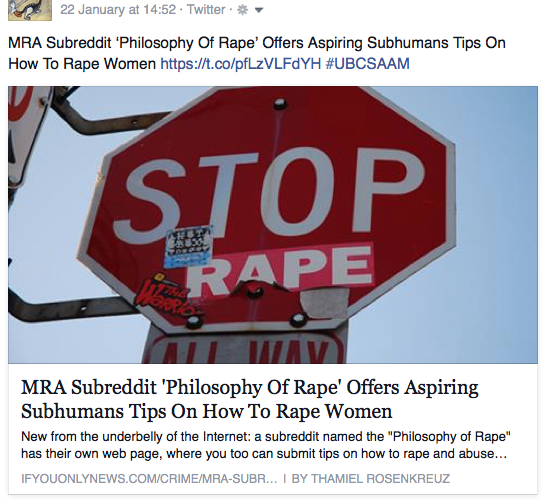Or: on consent, what can be done about rape culture, and how university education can help.
Here’s the quick version:
In collecting up bits and pieces online and posting them on Facebook, this is one of the items that resonated the most and best. With more people, and with a diverse group of people. Not “just” obvious audiences of women, feminist women, feminist women talking about rape and the patriarchy. This image was reposted and shared by various people of various sorts, including men.
I think that’s important. Rape and/or other forms of sexual violence (I’m not entirely sure where to draw the line, or if there is one) aren’t A Women’s Issue or A Women’s Problem.
This is a human problem.
All humans are potential rape victims.
Women (or cis-women, if you prefer) aren’t the only people who get raped. The fact that they are the majority of victims is important, but that doesn’t mean that we shouldn’t also think about other rape victims too. About other women (trans-women, two-spirit people, the whole rainbow of womankind), who are women too. We are humans, with big complex brains, capable of keeping more than one idea or person in mind at once.
As humans we ought also to be capable of thinking as humans and doing so in complicated ways. As the multiple things each of us marvellous individuals happens to be: species, gender, race, personal history, family history, histories and geographies of all our places of belonging, “culture” in short and in whatever order or simultaneity works best, individually. And in imaginative sympathy with things we are not, because of that “being human” aspect that we all share. In compassionate community with strangers and the strange.
Any rape hurts all humans, in existential solidarity. (Without detracting from the particularity of the crime: it’s sexualised, it’s specific in its choice of target. Targetting is another form of dehumanisation, objectifying a person, turning them into a symbol representing the specific group or idea that is hated.)
Anything that adds to rape, exacerbates or aggravates it, is a part of rape. (That includes its specificity, as a hate crime against a specific target of choice.)
That would include using force or weapons or other implements; causing further physical and psychological damage before, during, or after; and any formal (social, communitarian, legal) procedure after the fact that adds further trauma. That would include friends, family, home or other place of residence, village, workplace, university, city, province, country, …
(I have many problems. I’m human and having problems and being a problem is part of the human condition. But back to this specific problem.)
My problem—the one I’m trying to tackle today—is that I don’t understand some things that are apparently obvious evident and maybe even “natural” parts of our world and “normal” everyday life. I’d like to understand, selfishly, out of human curiosity about other humans and love of learning. I’m an out-and-proud geeky nerdy sort. Maybe I’m also wrong-headed and stupid. I hope not, or at least enough “not” to be capable of learning.
Here’s a thing I don’t understand. Why rape? Why contemplate or attempt it, including all the various degrees of “rapeyness”? Why are all of them rapey, not “just” full proper “rape-rape”? How does what happens around and after it become part of rape? What’s the relationship between sexual offences and other sorts of offence? Is one sort of assault worse than another? Does there have to be a competition and ranking here, or does that actually not help but hinder?
See how the simple fails.
I’m a simple creature, and a simpler-minded one than many of my fellow contributors to #UBCSAAM. That having been said, I know that I have a bad habit of over-complicating and over-thinking things. What’s going to be hard for me is going to be keeping things simple, without annoying myself (and others) by over-simplifying.
OK. Back to the simple question: why rape? Why would consent be a difficult concept to understand? I mean, the dehumanising abusive attitudes of rape apologists and butt-hurt whingeing about assaults on men’s rights doesn’t seem to have a parallel in other offences against the person: an absolute right to one’s own pleasure, the unalienable freedom to beat people up, stab them, carve them up to create extra orifices into which to insert objects, and otherwise torture and mutilate them without their consent. Or to murder them.
That’s the difference between the Marquis de Sade, torture porn, snuff porn, horror, fantasy … and life.
Not seeing and understanding that difference is an imaginative failure that parallels the imaginative failure of lacking human compassion, through a lack of an awareness of shared humanity. It’s dehumanising, inhuman, pathological. Like other forms of sociopathy and psychopathy. I’d like to think this is a malady (and I use the word advisedly for its etymological resonances, rather than “disease”) that can be healed. I’d like to think that information, learning, and education can be therapeutic, in a Renaissance Humanist way. I’d like to think that few-to-no people are so dehumanised and inhumane as to be lost causes, unable to be helped.
Consent, as Rockstar Dinosaur Princess aptly puts it, is not that complicated.
COMING UP NEXT: (2) RESOURCES / TEACHING MATERIALS
Featuring
- Some current parallels, like #femfog in the Medievalist community
- Older post on here
- Collected bits and pieces via Facebook and Twitter over the last week
- And some more verbiage


